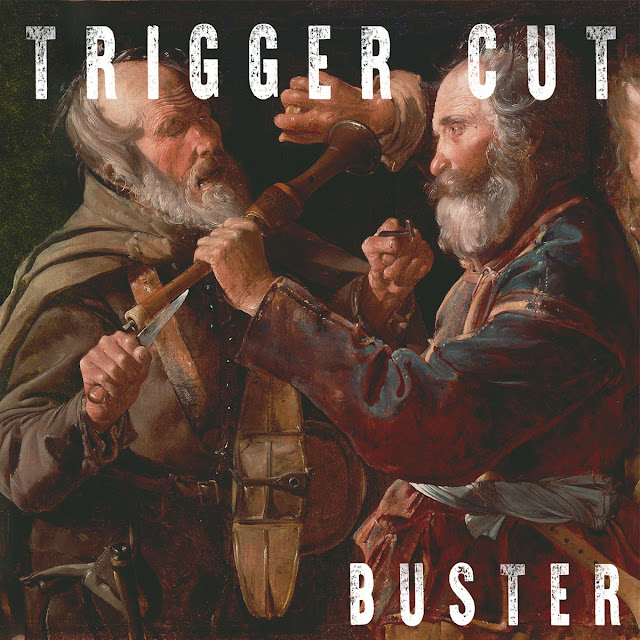TRIGGER CUT - BUSTER
TRIGGER CUT - BUSTER
Rock rhythm’s evolutionary war of attrition against melody/harmony has
been raging since the 1980s/90s heyday of Swans and Melvins. Chalk up another
victory for rhythm with German three-piece Trigger Cut’s 2019 debut album Buster.
A modest victory: melody retains hard-won territory in this encounter. The
dynamic focus of the power trio format gives a keener edge to its vestigial
status while illuminating its continued necessity as dialectical foil.
Taking their name (seemingly) from a Pavement song, the Stuttgart-based
trio delivers an eminently digestible collection of songs
post-punk-skuzz-grunge-name your messthetic designation. Noise rock tropes come
in ample measure and variety: stop/start rhythms and pummeling dynamics,
distorted riffological severity emanating from treble-centric guitars,
non-pretty vocals.
Lead singer/guitarist Ralph Schaarschmidt sounds like Stephen Malkmus,
Steve Albini and Crocus Behemoth fighting for supremacy in a blender in the way
King Buzzo can sometimes sound like a vocal cock-of-the-walk throwdown between
Metallica’s James Hetfield and WWF hero/villain Randy ‘Macho Man’ Savage. It’s
a constrained transatlantic yelp without much trace of local accent, most
notably on ‘King of Inks’.
That song’s title suggests a connection to The Birthday Party’s ‘King
Ink’. The titular monarch of Nick Cave’s song is an anthropoid synecdoche for
creative frustration. Who knows what the King of Inks’ beef is?
Lyrics made handily discernible for the song’s video don’t offer much in the
way of enlightenment: ‘No fair. No flair’(?) The lyrical obscurity and
vocal pastiche affectation bring a humour to Buster that both
alleviates and enlivens the music’s more abrasive qualities. The combination
puts Trigger Cut in the company of noise rock’s most postmodern pop-oriented travelers: Lubricated Goat, Butthole Surfers, Pixies.
Homegrown elements gleam more prominently in the trancey coda fade-out
to ‘King of Inks’. Early 70s krautrock minor leaguers Silberbart and the
bolero-style conclusion to their super stoopid stoner soul/proto-no wave
freakout ‘Brain Brain’ comes to mind mind. Schaarschmidt’s guitar sound has a
glassy brittleness not dissimilar to Gang of Four’s Andy Gill (as do a lot of
noise rock guitarists admittedly), matched with the Plank/Hannett school of
delay sculpture. Slapback echo on ‘I Know She Knows’ and alleyway reverberation
on 'Free Hugs' suggest all manner of wired-up post-punk nihilism. There’s a
brutal, tribal intensity to the verse riff-rhythm of ‘I Know She Knows’ that’s
like Swans (or maybe Killdozer) jamming with Caspar Brotzmann Massaker.
The Brotzmann family heritage encompasses No Wave and avant-garde jazz
synergies that occasionally emerge like a leviathan fin breaking the surface of
public awareness. Trigger Cut aren’t as deliberate as The Jesus Lizard’s
appropriation of the hyper-tensile, anti-melody line of Miles Davis’ ‘Great
Expectations’ for Goat’s opening track ‘Then Comes Dudley’. But
there’s a playful blending of styles in their sound that certainly promises the
protean protoplasm that jazz exudes as marriage broker between blues and rock.
‘Hellcat Bob’ injects groove punk/metal (Fugazi/Helmet/Eyehategod) into liquid
Shellac, and 'Blind' taps into a certain stratum of mutant rockabilly (The
Cramps/The Fall/Pussy Galore) while retaining the bludgeoning menace of Big
Black and Teenage Jesus. 'Pony Pony' evokes the 60s psych origins of post-rock
and math rock, kissing cousins both to noise rock. Captain Beefheart’s Dadaist
anthems of C&W sea shanty/ rock deconstructed as African guitar polyphony
('Moody Liz'/'Veterans Day Poppy') feeding into math rock (Slint/Don Caballero)
and all its more melody/harmony-adjacent variations; for one, a variety of
post-Sonic Youth angle-jangle that Polvo occasionally essay quite nicely thanks
(hear ‘Virtual Cold’ from Celebrate the New Dark Age).
Trigger Cut’s musico-dialectical positioning shouldn’t
detract us too much from appreciating their own particular tributary. While
steeped in a certain Touch & Go/Amphetamine Reptile Records heritage of
adamantine post-punk exploration, they’re obviously aiming for a blend of
styles that’s unique to them. The brevity and cohesion of Buster recalls
some of punk’s short/sweet classics. There are crucial differences
between fake punk (Do we need to name any? Okay, Blink 182/Sum 41 for their
vapid names alone) and real punk (everyone mentioned here, a few others: Dead
Kennedys on 'The Miners are Back’). No one will tell what all this is about. But I will find out.
Text: (C) Jon Kromka 2020
https://triggercut1.bandcamp.com/album/buster




Comments
Post a Comment